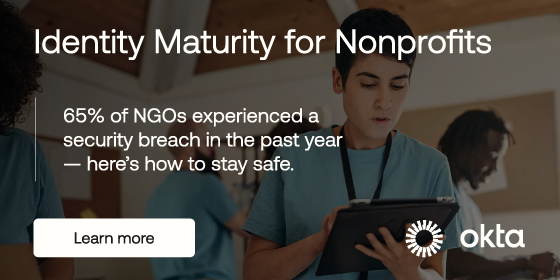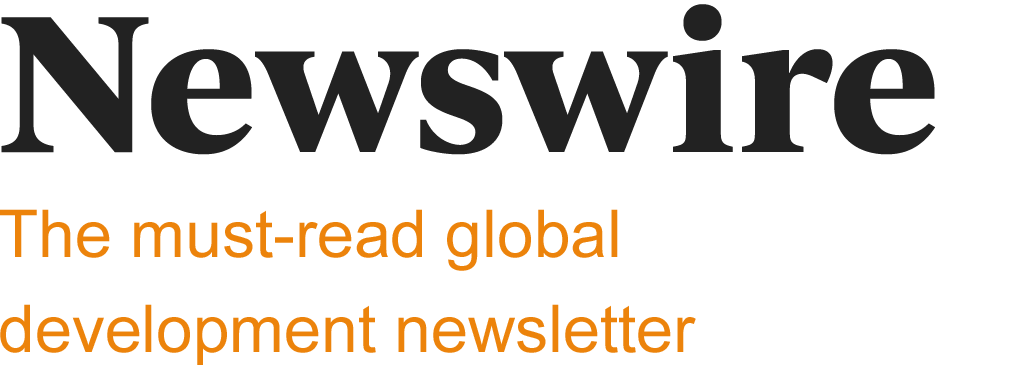|
Some surprising potential appointments at USAID.
|
|
|
|
U.S. President Donald Trump is often referred to as unpredictable (including by me). But upon taking office yesterday, he was entirely predictable, keeping promises he loudly trumpeted on the campaign trail. Among the first casualties? Foreign aid, climate change, and global health. Also in today’s edition: More insider intel on who might be coming to USAID. 
|
|
Stop right there
For months, aid advocates have tried to find silver linings in Trump’s presidential victory. Republicans support localization; they may not agree to sharp budget cuts; foreign aid aligns with Trump’s geostrategic aims, yada yada yada.
Was it all wishful thinking? The initial signs coming out of the new White House are hardly encouraging. Shortly after taking office, Trump issued an executive order pausing all foreign development assistance for 90 days. The first paragraph describing the purpose of the order is blunt and ominous: “The United States foreign aid industry and bureaucracy are not aligned with American interests and in many cases antithetical to American values. They serve to destabilize world peace by promoting ideas in foreign countries that are directly inverse to harmonious and stable relations internal to and among countries,” it states. Reviews of each foreign assistance program will be done by the responsible department and agency heads under guidelines provided by the U.S. secretary of state, in consultation with the director of the Office of Management and Budget, according to the order. After the 90-day period, it will be determined whether to “continue, modify, or cease each foreign assistance program.” “Additionally, any other new foreign assistance programs and obligations must be approved by the Secretary of State or his designee, in consultation with the Director of OMB,” it states. One potential silver lining? The secretary of state, Marco Rubio, who was confirmed yesterday, can waive the pause for specific programs. ICYMI: ‘We can work with him’ — aid advocates react to Trump’s Rubio pick |
|
A message from Okta
 Okta outlines benchmarks for nonprofits’ cybersecurity measures A great mission deserves the best Identity solution. At Okta, we believe in technology’s transformative potential for humanity. We built our Nonprofit Identity Maturity Model to help nonprofits strengthen their cybersecurity, work more efficiently, and increase donor engagement. Find out where your organization might be and what you can do next today. |
|
Fire and brimstone
Let’s not mince words: Trump’s inauguration speech painted a picture of a country in the bowels of hell that he alone could lift up. The irony is that many climate advocates take a similarly apocalyptic tone about the extreme weather sweeping the globe.
Wasting no time, Trump landed a fierce, albeit expected, blow: After declaring “We will drill, baby, drill” in his inaugural address, he swiftly pulled the U.S. out of the Paris Agreement. On the one hand, the move comes as a surprise to no one. On the other hand, the world’s largest economy and biggest historical emitter of greenhouse gasses abandoning its climate commitments still hurt. While it takes a full year for a country to exit the agreement after announcing its intentions, experts say that Trump’s decision will impact how climate talks progress over the next year and set the groundwork for the COP30 U.N. climate summit in November, my colleague Jesse Chase-Lubitz writes. “It comes at really the wrong moment,” says Adrianna Hardaway, senior policy adviser for climate at Mercy Corps. “Climate talks are at a really fragile place and I think that the U.S. stepping away at this moment will further erode those discussions, further erode trust in the process and the relationships.” “Withdrawing from Paris might for sure be a short-term political priority but in the long term it is in the U.S.’s best interest to be part of these international conversations,” Hardaway adds, pointing to the recent fires in California as proof that climate change is hitting Americans hard. “The rules for the international climate game will continue to be written with or without the U.S.” Read: Paris Agreement in peril as Trump reenters White House |
|
The clock doesn’t stop
Climate change is here to stay, regardless of how the political winds blow at any given moment. Also here to stay? A slew of climate-related negotiations, events, and deadlines planned for 2025.
Jesse has compiled an essential primer on key climate moments to watch this year as the world plods along to COP30 in Brazil. Pro tip: Bookmark this one, as it’ll be useful throughout 2025. She writes that from the integration of biodiversity and climate goals at February’s UNDP-led discussions to the “Road to Belém” that emerged from COP29, the months ahead are as much about ambition as they are about accountability — with or without Trump. Explore the visual calendar: The climate development milestones to watch in 2025 |
|
WHO’s on the chopping block first
The Paris Agreement isn’t the only sacrificial lamb on Trump’s Day 1 agenda. The new president is also withdrawing the U.S. from the World Health Organization.
The financial hit is huge. U.S. contributions cover about 15% of WHO’s budget, and a large chunk of these funds go to vital health programs, such as emergency preparedness and response, HIV and tuberculosis, and childhood vaccinations, my colleague Jenny Lei Ravelo writes. Many WHO staffers are also paid for by U.S. contributions. The move, like the Paris withdrawal, isn’t a shock. Trump already tried to withdraw from the WHO during his first term but the clock ran out. This time is different — in many ways. When Trump froze funding to WHO back in 2020, other donors such as Germany stepped in. However, all experts Devex spoke to in recent weeks aren’t so sure the same scenario will play out again. Lawrence Gostin of Georgetown University said that political crises in Europe mean the region “is unlikely to come to WHO's rescue, either economically or politically.” As one health official told Jenny: “I think a lot of people around the world were in denial that Trump would come back, so they weren't necessarily prepared for again this worst-case scenario.” Read more: Trump orders US exit from WHO. Can it survive the financial hit? |
|
Maternity Matters: Funding the Future: Sponsored by MSD for Mothers
Opinion: How to sustainably accelerate maternal health outcomes
At the 79th session of the United Nations General Assembly, leaders called for member states to take decisive actions to enhance maternal and newborn health. Here’s how proven approaches through collaboration are spearheading progress. |
|
Crony island
As we reported yesterday, Pete Marocco, a polarizing former Trump official, is in the mix for USAID administrator. He’s not the only controversial figure who could set up shop at the agency.
While there has been no official confirmation, multiple well-placed sources tell Devex these individuals were slated to get the following appointments: Mark Moyar as deputy administrator for policy and programming; Tim Meisburger as head of the Bureau of Humanitarian Assistance; and Mark Kevin Lloyd as head of the Bureau of Conflict Prevention and Stabilization. Moyar wrote “Masters of Corruption: How the Federal Bureaucracy Sabotaged the Trump Presidency,” a book about how USAID was infiltrated by the alleged “deep state,” a term used by conspiracy theorists to denote a hidden network of unelected officials who secretly control government policy. On the other hand, The Washington Post reported in 2021 that Meisburger, a mid-level Trump appointee at USAID, would no longer be with the agency “until further notice” after minimizing the Jan. 6 Capitol riots in remarks to employees. In 2020, CNN reported that Lloyd, a Trump-appointed religious freedom adviser for USAID, had a long history of anti-Islam remarks that included expressing fear that Muslims were “all around us.” |
|
The next act
Who ultimately takes over what at USAID remains up in the air. In the meantime, the White House has released a list of acting leaders who will be in charge of U.S. agencies until a permanent replacement can be installed.
That includes USAID Chief Information Officer Jason Gray, who will serve as his agency’s acting administrator. “While I hope the nomination and confirmation of our 20th Administrator will be swift, for as long as that process takes, I will bring to this assignment an unwavering focus on strengthening our effectiveness and efficiency,” Gray wrote in an internal memo to staff seen by Devex. Of the political appointees set to join the agency, he said: “Please welcome and support them as they assume their responsibilities, so we can work together as one team to carry out our mission.” The memo also states that “we are eager to accomplish great things on behalf of our President’s foreign policy agenda.” Adding that among other things: “We will strengthen our efforts with greater attention to transparency, accountability, and integrity” and “ensure merit, performance, and results motivate decision-making.” |
|
special notice
How far have we really come in the fight against HIV?
Would you like to understand the remarkable advancements in HIV/AIDS treatment and the critical steps still needed to end the epidemic for good? Download our comprehensive report now for insights into the global fight against HIV/AIDS. Download the HIV/AIDS report now. |
|
In other news
Colombian President Gustavo Petro announced plans to declare a state of emergency after guerrilla attacks in the northeast killed dozens and displaced thousands. [AP] Trump shut down the CBP One app, which facilitated migrant appointments for legal entry, as part of his immigration crackdown. [DW] UNOCHA reported that 915 aid trucks entered Gaza on Monday, marking the second day of a ceasefire between Israel and Hamas after 15 months of conflict. [Reuters] 
|
|
Thank you for reading today’s Newswire, edited by Fiona Zublin, copy edited by Nicole Tablizo, and produced by Patricia Esguerra. Have a news tip? Email [email protected].
Forwarded by a friend?
Sign up here to receive the Newswire directly.
|
|
Devex thanks our partners for supporting our newsletters.
Our editorial content remains independent. Interested in partnering with us? Get in touch. |
|
Connect with us:
|





